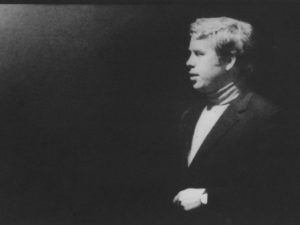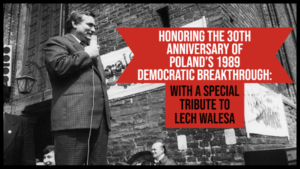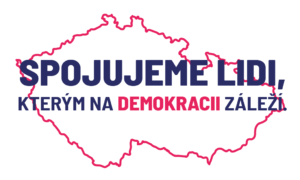Protests broke out in Prague Saturday on the 30th anniversary of the Velvet Revolution after courts confirmed that Prime Minister Andrej Babis collaborated with the StB, the Communist era secret police. About 300,000 protesters took to the streets demanding the prime minister’s resignation and supporting democracy, European unity, and NATO [HT:Cipher Brief].
Saturday’s demonstration, organized by the Million Moments for Democracy movement, was designed to celebrate the 30th anniversary, but also to draw attention to what critics contend is a dangerous drift away from its ideals, reports suggest.

Václav Havel 1965. Source Wikimedia Commons
In 1989, just eight days after the fall of the Berlin Wall, a student protest against communist rule was violently put down in Prague, the Czechoslovak capital. The crackdown on November 17 only strengthened the protest movement and, within days, hundreds of thousands of people were on the streets, RFE/RL adds. By the end of the month, the Communist Party agreed to hold free elections. In December 1989, dissident playwright Vaclav Havel was elected president by the country’s Federal Assembly, marking the beginning of a new democratic era.
Amid the adulation, however, another former Havel ally, Jan Urban, now a professor and political analyst at New York University in Prague, gave a more critical assessment, blaming him for indecisiveness, which bequeathed the Czech Republic unprincipled politicians and an unrepentant communist party that is still in parliament to this day, where it currently props up Babiš’s minority government, the Guardian adds:
“Václav was superb to the outside world. He put Czechoslovakia back on the map,” said Urban, co-founder of the post-communist Civic Forum movement. “But domestically he was a disaster. And I say that knowing he was a dear friend. ….“Havel’s time stopped any chance of the fast delegitimisation of the communist party. These civil conflict situations always demand symbolic gestures because people want to believe that the new regime will do its utmost to give society a sense of justice. This was his biggest failing.”
 “I always picture a simple comparison; the idea that members of [the Nazi party] would have sat in the West German Bundestag in 1975 is unthinkable. Why is a comparable situation normal here?” Urban added.
“I always picture a simple comparison; the idea that members of [the Nazi party] would have sat in the West German Bundestag in 1975 is unthinkable. Why is a comparable situation normal here?” Urban added.
On the anniversary of Communism’s collapse in Czechoslovakia, Edward Serotta draws on his on-the-spot recollections of the events to explain how to transform a one-party state into a democracy in a matter of weeks.
Every day the Communist Party officials had tried to cling to power like a man who has grabbed onto a boat that is drifting away from the dock, he writes for the Tablet:
They thought they could surrender just a few ministries. After all, who were they negotiating with? Artists? Playwrights? Musicians? But those creative types turned out to be quite skillful and they were backed by the crowds on the street. When Ladislav Adamec, prime minister, announced a new government on Dec. 3, there were 20 Communists and five nonparty members in it, the crowds were having none of it and he resigned on Dec. 7. On Dec. 10, the aging president, Gustav Husak, gave up the ghost.
 That was the night Civic Forum began announcing who its ministers would be, and Jiri Dienstbier, a crusading journalist in 1968 who had been fired and reduced to being a janitor, reported to his boss in the apartment house where he worked that he would not be there to stoke the furnace in the morning. He was going to be foreign minister. RTWT
That was the night Civic Forum began announcing who its ministers would be, and Jiri Dienstbier, a crusading journalist in 1968 who had been fired and reduced to being a janitor, reported to his boss in the apartment house where he worked that he would not be there to stoke the furnace in the morning. He was going to be foreign minister. RTWT
Think tanks and campaign groups in Prague have made the Czech capital a hotspot for critical analysis of the Chinese Communist Party’s repressive, hegemonic ambitions, adds CEPA’s Edward Lucas. That infuriates the leadership in Beijing—and gives hope to all those who suffer under its rule. It shows that Czechs can make a difference, not in size, but with the combination of imagination and determination.







